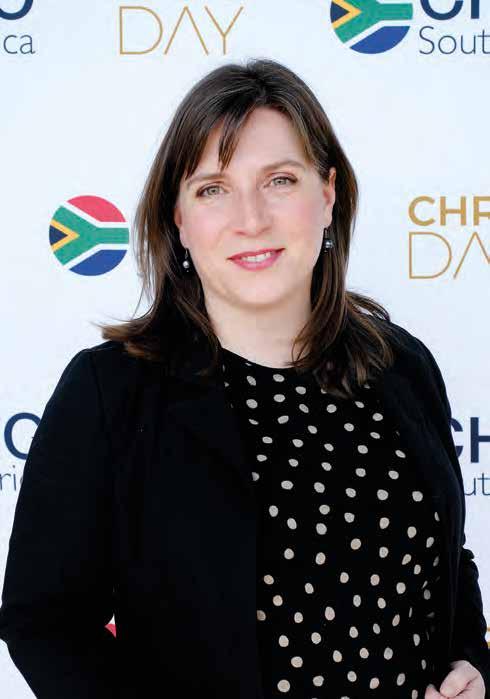
4 minute read
Accounting for a better world
ACCA South Africa business development manager Kada Phiri calls on accountants to play a role in improving the future by helping to build a better world. By Nicola Mawson
While we, in the South of Africa, are counting our blessings that the globe hasn’t yet entered WWIII, the Russia-Ukraine conflict is a reminder that lives are precious. We’ve seen many European countries open their hearts and homes to displaced Ukrainians, helping them fight the Russians, and providing aid. While the accountants of the world may operate in a space outside of all of this, they too, have a role to play, says Kada Phiri, business development manager at ACCA South Africa, the Association of Chartered Certified Accountants.
Advertisement
“The conflict highlights that we have a role to play in helping ensure that future generations inherit a world that hasn’t been destroyed, a platform upon which they can grow.” There is a need to support emerging economies so that they can trust businesses and institutions. All of us must also transform life-time education opportunities, build more inclusive and equitable societies, and respond to the climate emergency, he says. “While we, as accountants, cannot tackle these challenges alone, we can play our part and contribute to helping make the world a better place for the future in different ways,” says Kada. Accountants can help develop global standards of governance and regulations that underpin the workings of the modern economy, and deliver assurance and financial management practices that drive trust at the heart of sustainable organisations. After all, the profession is a cornerstone of economic and societal progress. As we all do this, ethics must be at our core and in the public interest, wherever it discharges its responsibilities across the world, says Kada. For accountants to play their roles in ensuring a brighter future, ACCA has seven core pillars against which they suggest that accountants around the world benchmark themselves:
• Economy: Building resilient economies • Talent: Developing the talent of tomorrow • Sustainability: Driving sustainable business • Regulation: Advancing standards and regulation • Public Sector: Transforming the public sector • Small Business: Supporting entrepreneurial growth • Trust: Strengthening ethics and trust
How we get there
Each of these seven pillars are vital if each accountant is to leave a lasting legacy. However, they require buy-in from everyone if they are to be implemented, says Kada. “In South Africa, a particular need is financial literacy and the improvement of financial skills, which underpins the sustainable development of our market. The accountancy profession helps expand financial literacy across countries, widens educational interventions and training programmes, and creates wider access for individuals to participate in the real economy. This is about ensuring a common finance language.” In fact, the accountancy profession is part of the fabric that helps individuals across society access financial training opportunities. From financial literacy campaigns to ambassadorial programmes and school education interventions, the role of the accountant is to be a force for public good in helping economies develop, Kada explains. At the same time, we need to promote trade and collaboration, he says. “Finance is key when it comes to modern international trade, which generates economic growth, resilience and international political stability.” The accountancy profession actively advocates the future benefits of free and open international trade and collaboration, while also contributing to the devel-
opment of the appropriate trade policies, regulation, common standards, and governance frameworks that facilitate this, Kada says. “One of our key priorities is continuing to help small- and medium-sized businesses (SMEs) participate in international commerce. Unlocking the potential of smaller businesses through international trade supports economic growth and job creation.” There are instances in which SMEs contribute 50 percent to the economy, and 60 percent to employment. We can’t ignore this vital, entrepreneurial, growth sector, he adds. Part of the way we get here, with SMEs becoming increasingly important, is to develop tomorrow’s talent, especially in a digital world, while pushing for an equitable workforce: “Grasp the potential of new generations instead of trying to make them conform to current expectations.” Sustainable business, too, is needed to ensure that economic growth is inclusive and consistent, while advancing standards and regulations need to continue to evolve as the world changes. We cannot afford to leave anyone behind, Kada says. The public sector also needs strengthening so it can play its part, while ethics and trust will go a long way towards ridding African countries of the scourge of brown envelopes being passed under the table to secure deals, he says. There is also a trust deficit as society continues to grapple with major trust-related issues, such as concerns with data privacy, intrusion, free speech, income disparity, government corruption, unequal access to employment opportunities, inadequate provision of public services and broader systemic racial and other equality challenges, Kada notes. “As accountants, we can go a long way towards rebuilding trust through ensuring ethical practices.” Together, we can all make a real difference in building a thriving economy that leaves no one behind, Kada concludes. l
For more information you can read ACCA's 2022 benchmark report on www.accaglobal.com.










